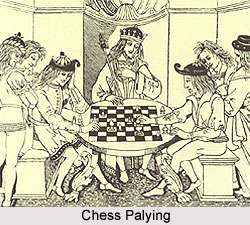 There was a degree of balance and harmony in all the arts and an efficient system of administration during the Gupta period. Peaceful and balanced social life was one of the chief features of the Gupta period. Society was in a very flourishing stage. The Smritis and accounts of Fa-Hien are the chief sources of knowledge about the social life of the Guptas.
There was a degree of balance and harmony in all the arts and an efficient system of administration during the Gupta period. Peaceful and balanced social life was one of the chief features of the Gupta period. Society was in a very flourishing stage. The Smritis and accounts of Fa-Hien are the chief sources of knowledge about the social life of the Guptas.
Caste System under Gupta Empire
Professions were determined by caste though not very rigidly. For example Brahmans followed trade, architecture and service as professions. They had even become kings. The Gupta emperors were Vaishyas. The Kshatriyas followed commercial and industrial vocations. There were many sub-castes among the Vaishyas and Sudras than among the higher castes. Sudras also could become traders and agriculturists like the Vaishyas. Outside the main settlements untouchables lived. They stroked a piece of wood while entering the city so that men might know of their coming and they could be avoided. They were engaged in hunting, fishery, scavenging and similar professions.
Family System under Gupta Empire
The joint family system was prevalent in the Hindu society. Partitions in the lifetime of the father were not approved. Ownership of property was vested in the father but the rights of sons and brothers to the property were also recognized. Adoption was not very much approved. The head of the family governed the family unit. The male members dominated the family and society.
Position of Women under Gupta Empire
Though women were subordinate to men in society, yet their position was no less significant. Women in Gupta society were idealized in literature. Women were given education but they could not recite the Vedic mantras. Pre-puberty marriages were common. Purdah had begun among the higher castes. A woman was considered as the mistress of her home. Widows could remarry sometimes. Sati system was rare during the period. Ideally woman was regarded as Shakti, the energizing principle. A woman was considered as Saraswati and Goddess Kali, creator and destroyer. They not only participated in public life but there is also reference to women teachers. There are instances that women used to take part in governmental and administrative functions. A married woman had to live with many wives of her husband. This custom was in vogue even in the royal family.
Dress and Ornaments under Gupta Empire
The male wore an upper garment and a lower dhoti though the Scythians introduced coats, overcoats and trousers, often worn by the Indian kings. Head dress was worn on special occasions. Women either wore a petticoat and a sari. A long sari had served both the purposes. To cover the bust a bodice was used below the sari. On ceremonial occasions silk garments were worn.
Ornaments were used over the forehead. Various designs were found in the earrings and necklaces. A gauzy pearl ornament was used over the breasts as well as the thighs. There were armlets, bangles, rings and anklets. Men also were fond of wearing ornaments. False hair was used to give different artistic shapes. The use of paints, pastes, powders and lipsticks was known.
Amusements under Gupta Empire
Amusements consisted of theatrical entertainments, dances, performances and musical concerts. Though gambling was a popular pastime, animal fighting, wrestling and athletics was no less popular in the Gupta society and was in vogue both in towns and villages.
Education under Gupta Empire
Education and learning constituted a significant status in Gupta society. Education during the Gupta period was provided by the Brahmanical agraharas and in Buddhist monasteries. No distinction was however made between Buddhist and Hindu teachings. Primary education was provided by members of the family. Formal and higher education was given in the agraharas or monasteries. Varanasi, Nasik, Kanchi were great centers of Brahmanical learning. Several universities had sprung up under the patronage of the Gupta kings. University of Nalanda was the legendary Buddhist University, which provided outstanding education regarding various branches of art, philosophy, grammar, humanities, astrology
The social conditions of the period show that people were happy, well-placed in life and fond of the good things of life. Fa Hien, the Chinese traveller who had visited India in the days of Chandragupta II did say "The people are numerous and happy. They have not to register their households, or attend to any magistrates and their rules. The king governs without decapitation or other corporal punishments. People of various sects set up houses of charity where rooms, couches, beds, food and drink are supplied to travellers."



















